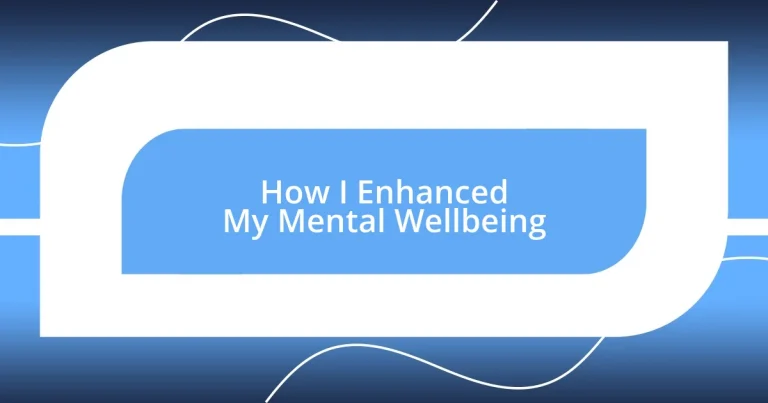Key takeaways:
- Mental wellbeing encompasses emotional balance and the importance of connection, highlighting practices like journaling and reaching out to friends for support.
- Prioritizing mental health enhances emotional resilience, relationships, productivity, and overall quality of life.
- Building a support system, tracking progress, and utilizing resources like books, courses, and podcasts are vital for continuous improvement in mental wellbeing.
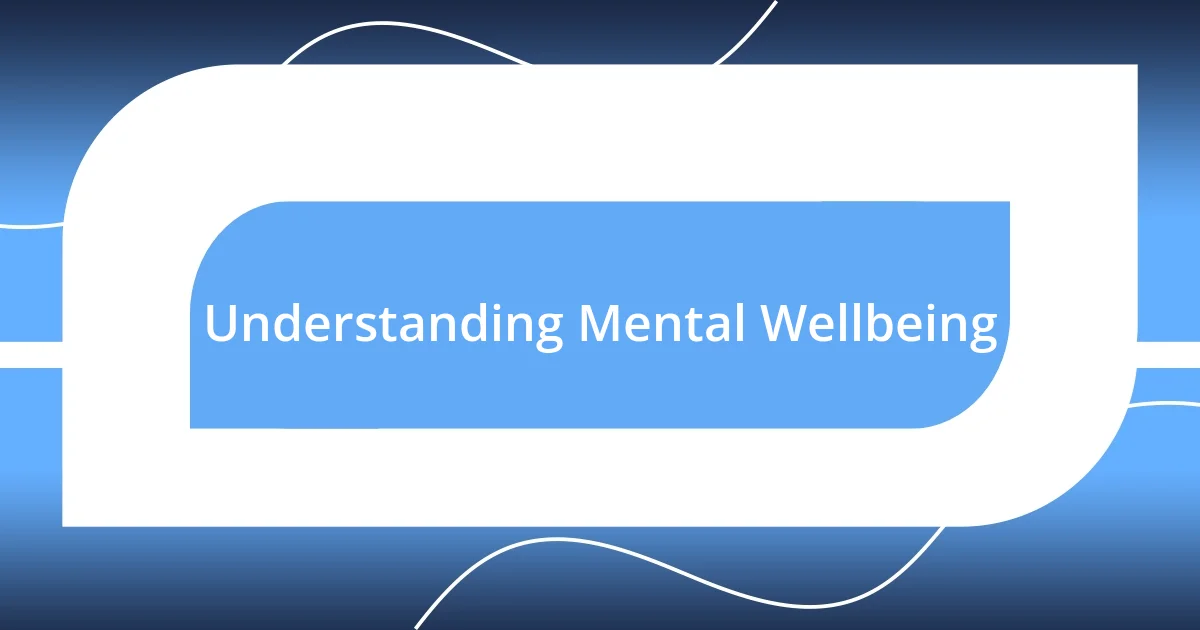
Understanding Mental Wellbeing
Mental wellbeing isn’t just the absence of mental illness; it’s about thriving emotionally and psychologically. I remember a time when I was caught in a whirlwind of stress and anxiety. It made me wonder—what does it really mean to feel mentally well?
One thing I’ve learned is that mental wellbeing involves a balance of emotions, thoughts, and behaviors. For instance, I started journaling during particularly tough days to explore my feelings. This practice not only clarified my thoughts but also helped me better understand my emotional landscape, turning chaotic moments into productive reflections.
I often reflect on the importance of connection in this journey. During one challenging period, reaching out to a close friend made all the difference. How often do we overlook simple acts of sharing our struggles? Engaging with others brought not just relief, but also a sense of belonging that is vital for mental health.
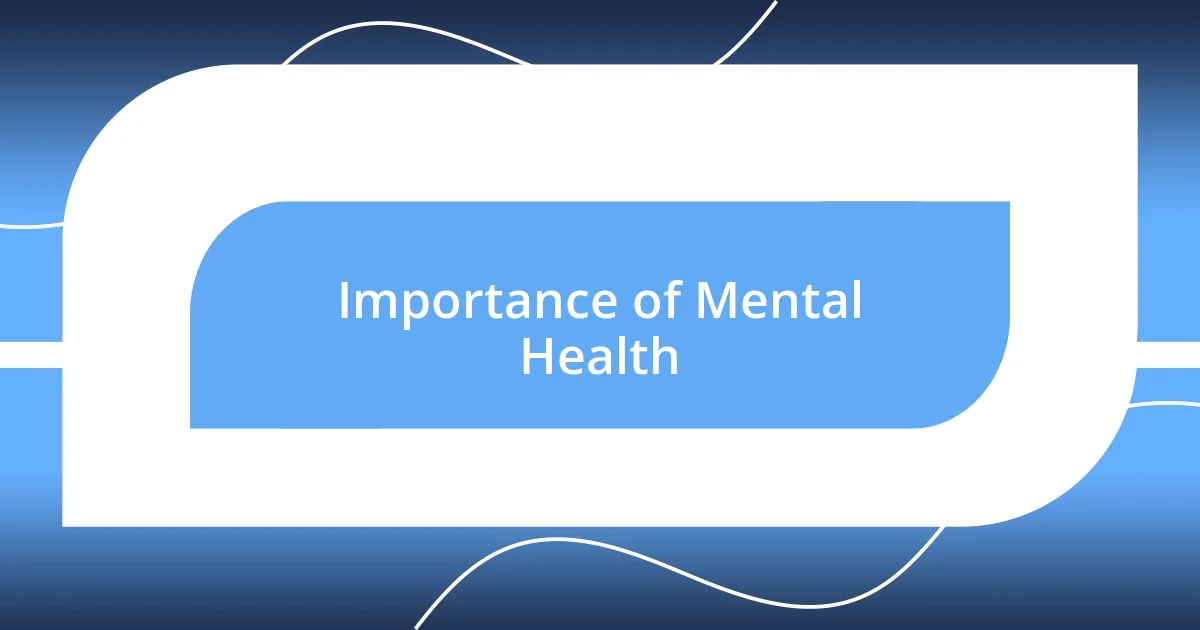
Importance of Mental Health
Mental health is essential for every aspect of our lives, influencing how we think, feel, and interact. I’ve found that when I prioritize my mental wellbeing, everything else falls into place. For instance, after focusing on my mental state, I realized my relationships thrived, my productivity increased, and even my physical health improved.
Here are some reasons why mental health matters:
- Emotional Resilience: Strong mental health helps us cope with stress and adversity.
- Improved Relationships: When we feel good mentally, it enhances our ability to connect with and support others.
- Enhanced Productivity: A clear, focused mind allows for greater creativity and efficiency in tasks.
- Physical Health Benefits: Good mental health often correlates with better physical health, leading to a more balanced life.
- Overall Quality of Life: Focusing on mental wellbeing leads to greater happiness and fulfillment.
I remember a moment when I felt overwhelmed by daily pressures. By taking a step back and caring for my mental health, I was able to view those challenges as opportunities, transforming my mindset entirely. It’s incredible how nurturing my mental state has a ripple effect on all facets of my life.
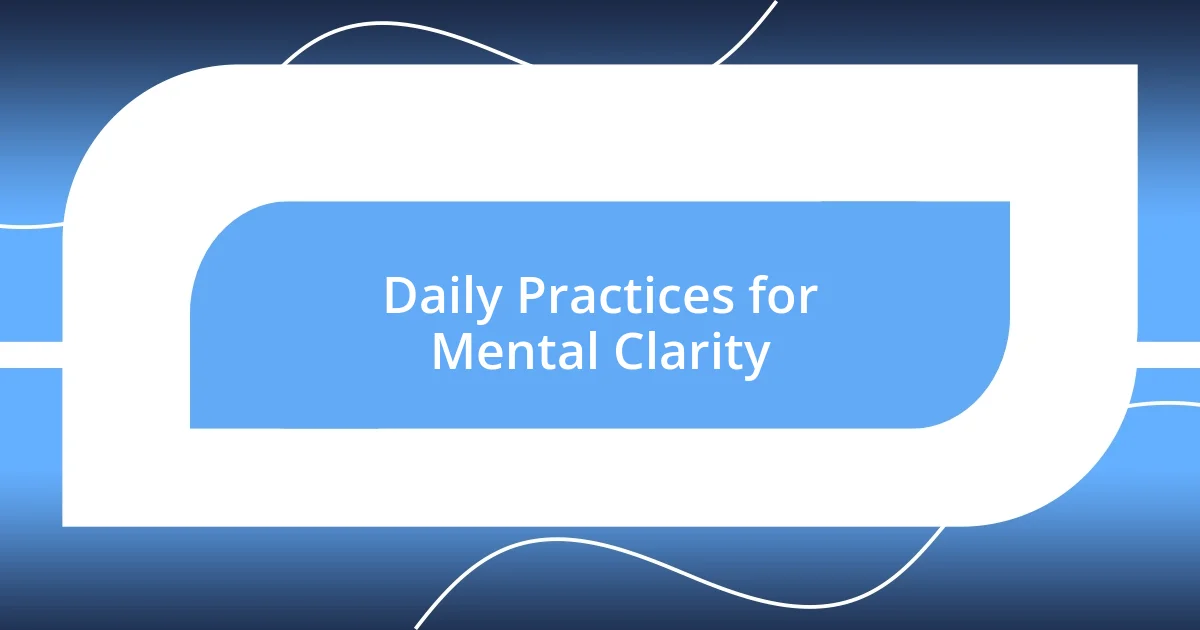
Daily Practices for Mental Clarity
Daily practices play a crucial role in achieving mental clarity. I’ve found that taking just a few moments each morning for mindfulness meditation dramatically shifts my perspective for the day. This practice allows me to ground myself and sets a calm tone, making the chaos of daily life feel more manageable.
Another practice that has proven invaluable is the habit of maintaining a gratitude journal. I recall one particularly rough week when I felt constantly overwhelmed. Taking time each day to note what I was thankful for helped me focus on positive aspects of my life and diminished negative thoughts. It’s fascinating how reflecting on little moments of joy can clear mental clutter and bring about a sense of peace.
Additionally, organizing my environment has a surprisingly profound impact on my mental clarity. I remember decluttering my workspace last fall, and it felt like lifting a weight off my mind. A tidy space fosters a focused mindset, reducing distractions and inviting creativity. These steps may seem small, but they collectively contribute to a clearer, more engaged mental state.
| Practice | Description |
|---|---|
| Mindfulness Meditation | Morning practice that helps ground and calm the mind. |
| Gratitude Journaling | Writing down what you’re thankful for each day to shift focus towards positivity. |
| Organizing Your Space | Decluttering and tidying your environment to enhance focus and creativity. |
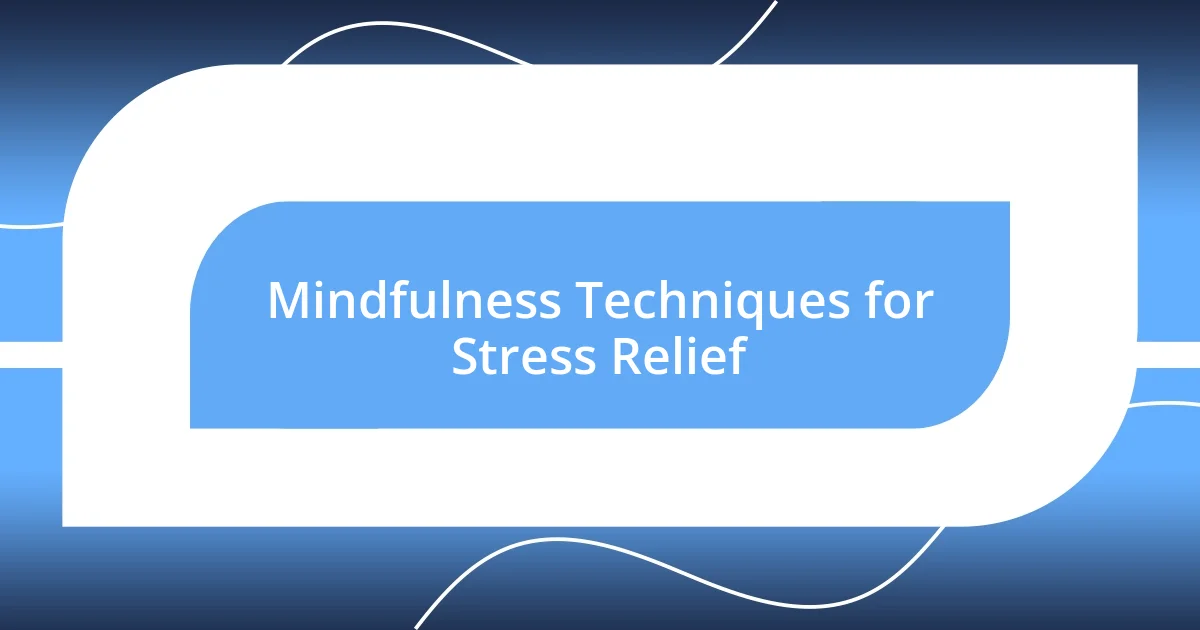
Mindfulness Techniques for Stress Relief
I’ve discovered that mindfulness techniques can be powerful allies in reducing stress. One practice that has truly transformed my experience is mindful breathing. Simply pausing for a few moments to focus on my breath allows me to reconnect with the present. During stressful days, I often felt like everything was spiraling; taking those deep breaths brought me back to center and eased my racing thoughts.
Another technique I admire is body scanning. Lying down and progressively relaxing each part of my body became a soothing ritual. I remember the first time I did it, I was amazed at how much tension I was holding in my shoulders. Identifying those tight spots led to a wonderful release, almost like peeling layers off a stress-filled onion. It’s engaging—how often do we truly check in with our bodies through such mindful awareness?
Lastly, I can’t overlook the power of mindful walking. This simple act of walking slowly with intention allows me to soak in my surroundings. I often find that rather than just rushing from point A to point B, I can absorb the sights, sounds, and even smells around me. There was a day when I strolled through a park, tuning into the rustle of leaves and the warmth of the sun, and it felt like an instant escape from my worries. Doesn’t it make you wonder how much more peace can be found in the small moments if we just take the time to truly pay attention?
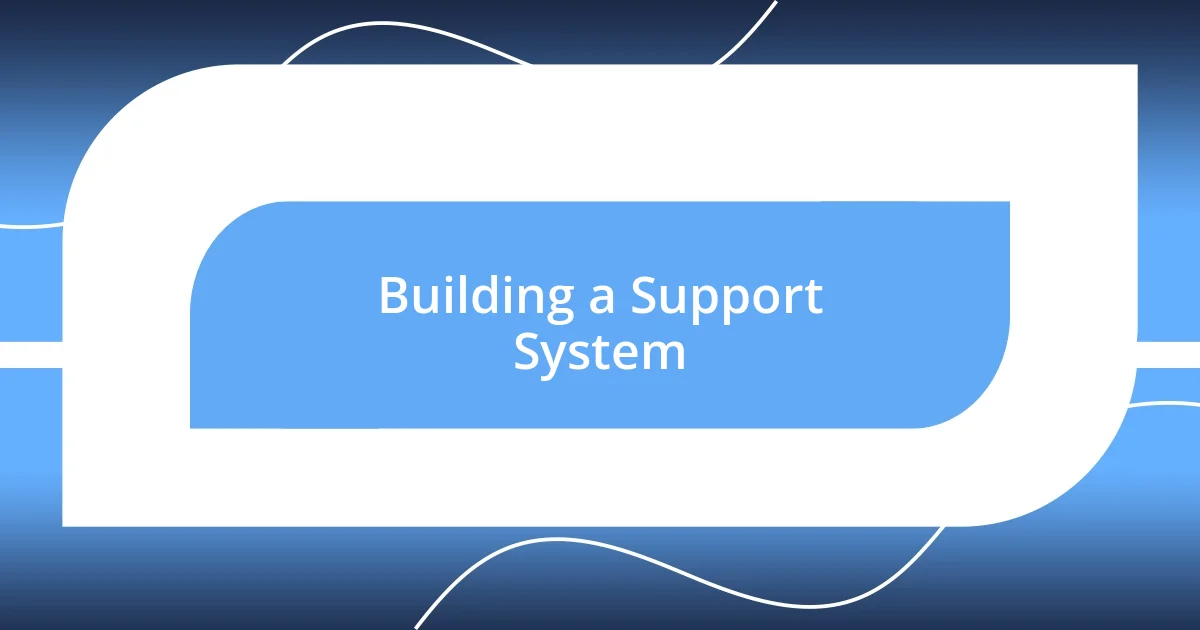
Building a Support System
Creating a support system has been one of the most transformative steps in enhancing my mental wellbeing. I vividly remember the time I reached out to a close friend during a particularly tough period—just sharing my feelings made such a difference. There’s something incredibly powerful about having someone who listens without judgment. It may seem small, but the act of opening up can be the first step towards healing.
I’ve also learned the importance of surrounding myself with individuals who uplift and inspire me. One day, I decided to disconnect from some negative influences in my life. When I began engaging with more positive friends, it felt like a breath of fresh air. Their enthusiasm and support encouraged me to pursue my goals more fully. Doesn’t it amaze you how the right people can energize your spirit in ways you never expected?
Additionally, I’ve found that joining local community groups has enriched my support system tremendously. Whether it’s a book club or a fitness class, being with others who share your interests creates a bond that nurtures emotional health. I recall the first time I attended a community yoga session; the shared energy in the room was palpable and made me feel truly connected. Isn’t it wonderful to realize that building connections doesn’t always have to be complex? Sometimes, it’s just about being present in a shared space with like-minded individuals.
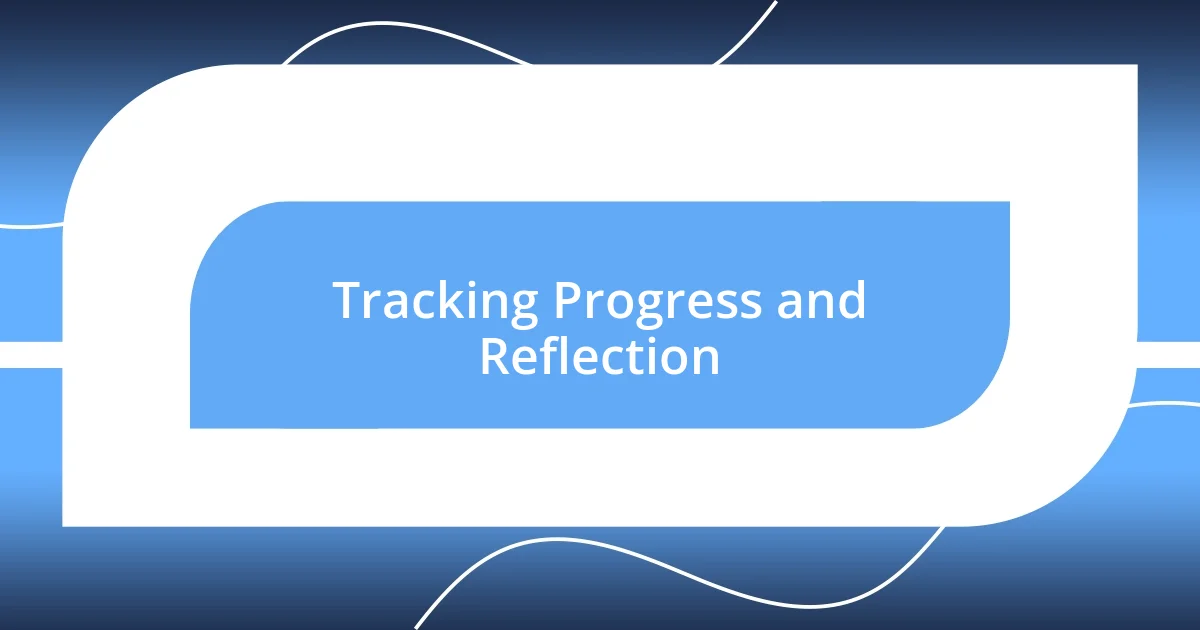
Tracking Progress and Reflection
Tracking my progress has been essential in understanding how far I’ve come on this mental wellbeing journey. I started using a simple journal to jot down my thoughts and experiences daily. Looking back at older entries, I often feel a rush of gratitude as I see the shifts in my mindset—what once felt unbearable now seems manageable. Isn’t it fascinating how writing can provide such clarity?
Reflection is another powerful tool. I dedicated each Sunday evening to reviewing my week, assessing not just my successes but also the challenges I faced. One particular week, I recognized a pattern in my feelings; after engaging in social activities, I felt a boost in mood that I hadn’t fully acknowledged before. This insight had me wonder—how often do we overlook those moments of joy in our daily lives?
I also implemented a visual progress tracker in my living space. It’s a simple chart that marks highlights such as moments of gratitude or days I practiced self-care. There was a sense of accomplishment when I colored in each box, reinforcing positive habits. It made me consider—could a little visual reminder be the solution for many of us who thrive on tangible evidence of growth?
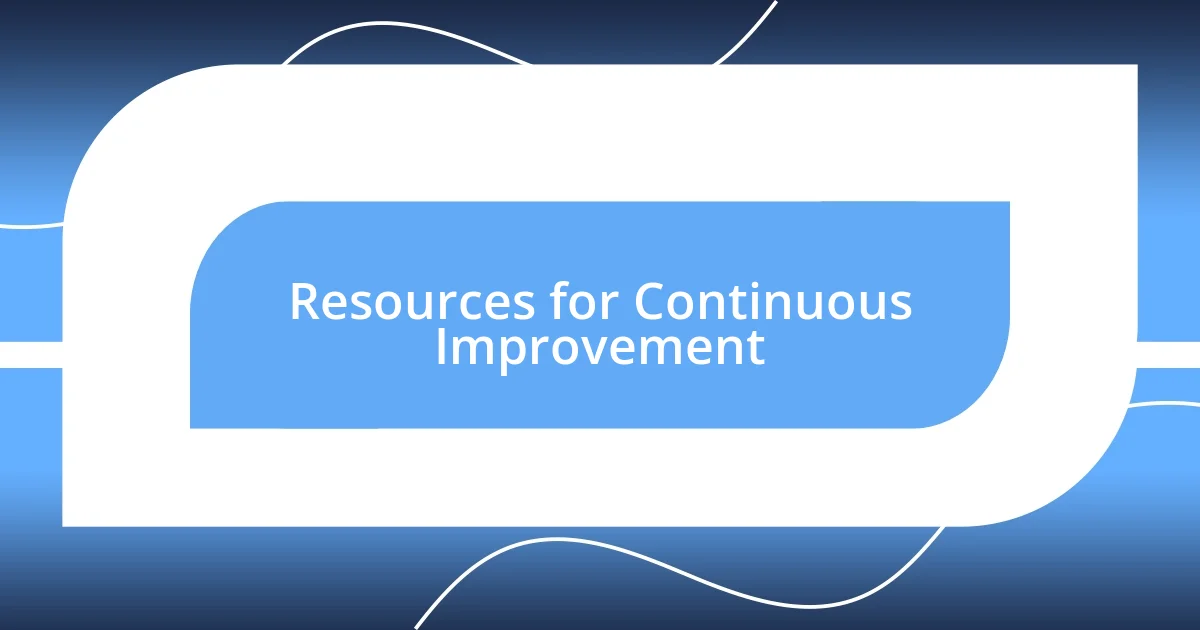
Resources for Continuous Improvement
I’ve discovered that a plethora of resources can aid in my continuous improvement. Books have become my go-to allies; one of my favorites is “The Gifts of Imperfection” by Brené Brown. Her insights on embracing vulnerability helped change my perspective significantly. How many times have I felt inadequate, only to realize that embracing my flaws can actually be a source of strength?
Online courses also opened new avenues for growth. I recently completed a mindfulness course that not only taught me techniques to manage anxiety but also provided a supportive online community. It was invigorating to connect with others who shared similar struggles—have you ever felt the relief of knowing you’re not alone in your journey?
Incorporating podcasts into my daily routine has unlocked another layer of mental wellbeing for me. I remember the first time I listened to a mental health podcast during my morning walk; it felt like having a wise friend accompany me. The discussions sparked new thoughts and prompted me to question my own beliefs about self-care. Isn’t it amazing how a simple conversation can lead to profound revelations?












